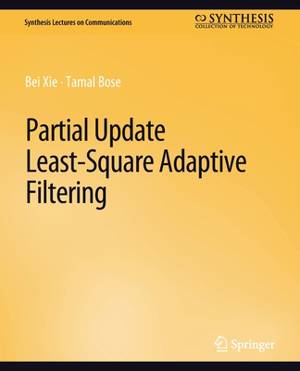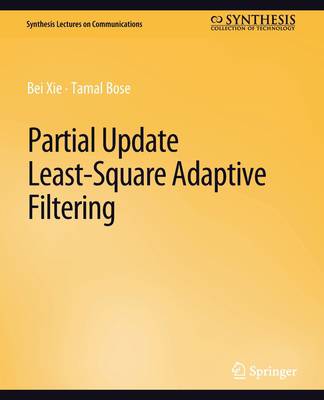
Door een staking bij bpost kan je online bestelling op dit moment iets langer onderweg zijn dan voorzien. Dringend iets nodig? Onze winkels ontvangen jou met open armen!
- Afhalen na 1 uur in een winkel met voorraad
- Gratis thuislevering in België vanaf € 30
- Ruim aanbod met 7 miljoen producten
Door een staking bij bpost kan je online bestelling op dit moment iets langer onderweg zijn dan voorzien. Dringend iets nodig? Onze winkels ontvangen jou met open armen!
- Afhalen na 1 uur in een winkel met voorraad
- Gratis thuislevering in België vanaf € 30
- Ruim aanbod met 7 miljoen producten
Zoeken
Omschrijving
Adaptive filters play an important role in the fields related to digital signal processing and communication, such as system identification, noise cancellation, channel equalization, and beamforming. In practical applications, the computational complexity of an adaptive filter is an important consideration. The Least Mean Square (LMS) algorithm is widely used because of its low computational complexity ($O(N)$) and simplicity in implementation. The least squares algorithms, such as Recursive Least Squares (RLS), Conjugate Gradient (CG), and Euclidean Direction Search (EDS), can converge faster and have lower steady-state mean square error (MSE) than LMS. However, their high computational complexity ($O(N^2)$) makes them unsuitable for many real-time applications. A well-known approach to controlling computational complexity is applying partial update (PU) method to adaptive filters. A partial update method can reduce the adaptive algorithm complexity by updating part of the weight vector instead of the entire vector or by updating part of the time. In the literature, there are only a few analyses of these partial update adaptive filter algorithms. Most analyses are based on partial update LMS and its variants. Only a few papers have addressed partial update RLS and Affine Projection (AP). Therefore, analyses for PU least-squares adaptive filter algorithms are necessary and meaningful. This monograph mostly focuses on the analyses of the partial update least-squares adaptive filter algorithms. Basic partial update methods are applied to adaptive filter algorithms including Least Squares CMA (LSCMA), EDS, and CG. The PU methods are also applied to CMA1-2 and NCMA to compare with the performance of the LSCMA. Mathematical derivation and performance analysis are provided including convergence condition, steady-state mean and mean-square performance for a time-invariant system. The steady-state mean and mean-square performance are also presented for a time-varying system. Computational complexity is calculated for each adaptive filter algorithm. Numerical examples are shown to compare the computational complexity of the PU adaptive filters with the full-update filters. Computer simulation examples, including system identification and channel equalization, are used to demonstrate the mathematical analysis and show the performance of PU adaptive filter algorithms. They also show the convergence performance of PU adaptive filters. The performance is compared between the original adaptive filter algorithms and different partial-update methods. The performance is also compared among similar PU least-squares adaptive filter algorithms, such as PU RLS, PU CG, and PU EDS. In addition to the generic applications of system identification and channel equalization, two special applications of using partial update adaptive filters are also presented. One application uses PU adaptive filters to detect Global System for Mobile Communication (GSM) signals in a local GSM system using the Open Base Transceiver Station (OpenBTS) and Asterisk Private Branch Exchange (PBX). The other application uses PU adaptive filters to do image compression in a system combining hyperspectral image compression and classification.
Specificaties
Betrokkenen
- Auteur(s):
- Uitgeverij:
Inhoud
- Aantal bladzijden:
- 105
- Taal:
- Engels
- Reeks:
Eigenschappen
- Productcode (EAN):
- 9783031005534
- Verschijningsdatum:
- 19/05/2014
- Uitvoering:
- Paperback
- Formaat:
- Trade paperback (VS)
- Afmetingen:
- 190 mm x 235 mm
- Gewicht:
- 217 g

Alleen bij Standaard Boekhandel
+ 69 punten op je klantenkaart van Standaard Boekhandel
Beoordelingen
We publiceren alleen reviews die voldoen aan de voorwaarden voor reviews. Bekijk onze voorwaarden voor reviews.











